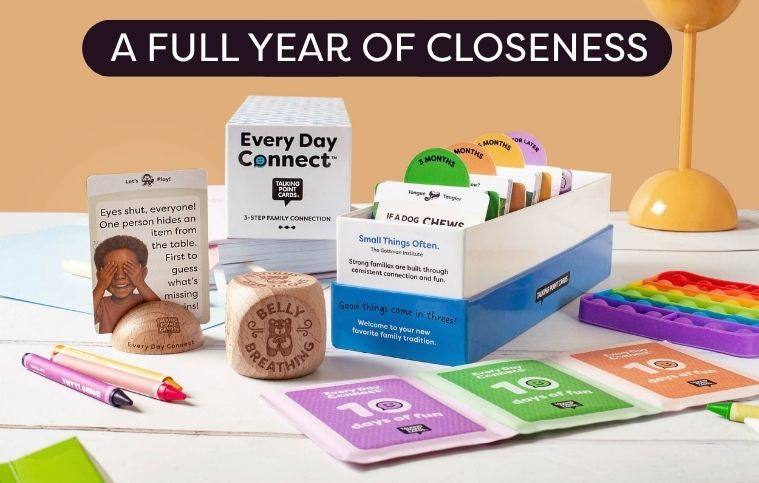SHOP
About
The Underrated Superpower Of Family Dinners
HOW A SIMPLE RITUAL CREATES RESILIENT KIDS

We all want the same thing for our kids - for them to grow up happy, healthy and resilient in the face of life's challenges. To have the strength to deal with the innate drama of the human experience without crumbling under the weight of it all. To still be smiling when curveballs get thrown their way.
But resilience can feel like an intangible, almost magical concept. How do you actually build it in kids when the world is so out of our control?
Well…
What if I told you there was a dead simple ritual that has been scientifically proven to create tougher, more resilient kids who are better equipped to handle life's endless supply of stressful situations and anxiety-provoking moments?
And that instead of putting more on your plate, this ritual actually took something off your plate - it solved the daily puzzle of getting nutritious food into your kids' bodies.
And that it had additional benefits like boosting kids' communication skills, expanding their vocabularies, improving their academic performance, and preventing future substance abuse and obesity issues.
And that the time investment involved tapped into that elusive sliver of the day when 100% of your family's attentional energy was focused in one place - no devices, no distractions.
*Impactful pause as you start to realize I might be referring to...*
Yes, I'm talking about that most retro of concepts - the family dinner.
Sound too simple to be true? Well, let's take a deep dive into the science and my reasoning:

What the Research Says About Family Dinners
While the benefits of family dinners have been floating around in "expert opinion" circles for a long time, over the past couple of decades a mountain of research studies have put hard evidence behind the claims.
The summarized highlights:
-
Better Communication and Language Skills: [A study from the University of Minnesota] found that kids who have infrequent family dinners have bigger problems with deceptive and distrustful communication. Other research shows that kids gain larger vocabularies through dinner conversation than from practically any other source.
-
Higher Academic Achievement: Researchers at Columbia University found that [regardless of family income or other factors, kids who eat family dinners regularly perform better in school].
-
Healthier Eating Habits: Regular family meals during adolescence is correlated with higher intake of fruits, vegetables and key nutrients in adulthood. Family dinners are also protective against eating disorders like obesity and bulimia.
-
Lower Risk of Substance Abuse: Research shows that [the more often kids eat dinner with their families, the less likely they are to use drugs, alcohol, or cigarettes].
-
Better Psychological Well-Being: Kids who have frequent family dinners experience [less depression and higher self-esteem]. Family mealtimes create an Island of Calm where kids feel reassured, safe, and connected.
-
Stronger Family Bonds: Regular mealtimes allow families to create their own rituals and traditions. The simple act of eating together reinforces feelings of family belonging and solidarity.

But the most compelling research finding of all has to do with that central topic of resilience.
A 2000 study by researchers at Emory University looked at how family routines and traditions helped teens cope with stress and anxiety. Their conclusion?
The kids who experienced family traditions like regular dinners together were much better at handling stress and recovering from crises.
The explanation boiled down to two factors:
-
Family dinners represent a consistent source of reassurance and stability in a child's life—the opposite of stressful chaos. This positive foundation makes it easier for kids to handle new stresses and bounce back from adversity.
-
Family traditions help build up children's reservoir of psychological resources to draw from in difficult times. The warmth, comfort, and communication skills cultivated during positive rituals like mealtimes become part of kids' inner strength and coping mechanisms.
That's a lot of science providing compelling reasons to bring back the tradition of family dinners.

So what do these dinners actually look like? What's involved? And what are some specific tips and tricks to put this into practice in a world filled with endless distractions and everyone's schedules going in a million different directions?
What Real Family Meals Look Like in Practice
Let's start with the big-picture view of what we're going for here:
The ideal family dinner involves everyone in the household gathering together nightly to connect over a shared, home-cooked meal. That's the vision. But in reality, both the frequency and the format can vary:
How Often?
According to researchers, children who eat family meals five or more times per week experience optimal benefits for their physical health and academic and behavioral outcomes. But even just two or three family dinners per week helps build resilience and offers the advantages listed above.
What Qualifies?
The meal needs to be eaten together with parents and kids, not in separate rooms. Take-out or frozen meals count - the conversation and togetherness matter more than what you're eating. But research shows that kids eat more fruits and veggies at true home-cooked dinners.
What About Weekends?
Weekends offer more flexibility to extend family mealtimes - adding in things like cooking the meal together, having multiple courses, and lingering over conversation. Some families make a bigger deal out of weekend dinners. The main requirement is everyone physically being there - no TV, devices, or distractions allowed. It's a sacred time to connect.
It's the only time of day when we're all doing the same activity together. The rest of the time, we tend to be scattered in different rooms, on different schedules, and often wrapped up in some form of entertainment or technology.
The family dinner provides one anchored block of time when you can strengthen your family bond and really listen to what's going on in each other's lives.
Let's look at some tips and best practices to make family dinners a reality for those of us juggling a million other things because one objective fact is that if done right, the benefits of family dinners are undeniable, even though meal logistics are easier said than done, especially these days when our noses are shoved constantly into our digital lives.

So How Do We Make Family Dinners Happen?
Seems simple enough, right? Sit down, eat a meal. But we all know the realities of competing priorities, jam-packed schedules, fickle kids, and a world working hard to pull families in different directions.
Here are some tips:
When to Do It
The sweet spot tends to be right after school/work—the mid-to-late afternoon or early evening hours. Some families try to make a routine by doing the same time every day for consistency. Others aim for 2-3 set nights of the week that work well for their schedules. The teenage years are notoriously tricky due to sports schedules and social calendars—having 1-2 committed nights may be the only option.
Set a Timer
I know, sounds weird. But a nice visual timer set for 30-45 mins can frame dinnertime as a priority—no one is dismissed until the timer goes off. It keeps devices off the table and encourages focused conversation and interaction without dragging on too long. Having a definitive end also makes it easier for anxious kids to engage.
Take Turns Choosing the Menu
To boost engagement and make sure everyone's tastes and preferences are represented, take turns letting each family member pick the meal or even cook it themselves (with appropriate adult supervision based on age). This promotes buy-in where kids feel invested in the ritual - "This is something I'm part of rather than something being forced on me."
Have a Few Rituals
Maybe Dad always says a corny joke before eating, or you share your Rose/Thorn/Bud (high/low/looking forward to) from the day. Having a couple of predictable traditions around your meals builds continuity and reinforces the specialness of the time. They don't have to be major rituals—just simple little moments you do each meal that become unique to your family.
Make It Phone-Free
Just don't allow any phones, tablets, or TV during family dinners. This should be the one sacred electronics-free zone for your family. Teach this rule from a young age—all devices get put away in a drawer or basket for the duration of the meal. You'll be modeling the importance of present human interaction over digital distraction. Plus, with no tech allowed, you'll actually have to talk to each other! Which brings us to…
Encourage Real Conversation
Family dinners are a golden opportunity for kids to build conversational skills. Don't let it devolve into silent eating or one-word exchanges. Come prepared with some conversation starters or questions like "What was the funniest/most interesting thing that happened today?" Or play a round of "High/Low" where everyone shares the best and worst part of their day. Open-ended questions that don't have yes/no answers work best for kids. And model the art of follow-up questions by asking kids to expand on their responses—"Oh really? Tell me more about that science project."
Don't Stress Over Perfection
The dinner doesn't have to be a 5-star culinary affair to be beneficial. Cold cereal with fruit counts. Use a crock pot or one-pan meals for ease. Order pizza. The point is to eat together, not wow with recipes. And don't stress if younger kids are antsy or misbehaving. This is a long-term practice to build appreciation for over the years. If you have an off night, make light of it: "Well this dinner is a mess, but at least we're doing it together!"
Create a Mood
Think romantic dinner but family edition! Use cloth napkins, light candles, put on some chill background music. Anything to make meals feel like an experience besides just hurried caloric intake. For little kids, let them help set the table or pick the playlist to give them ownership. These tiny touches reinforce that family dinnertime isn't just another obligation but a special wind-down tradition.
Share Highs and Lows
A simple but powerful ritual is to go around the table with each person sharing:
-
The best or "high" part of their day
-
The worst or "low" part of their day
Adults should model this exercise by giving their highs and lows first. Kids will get the hang of it and open up about positive experiences as well as the stuff weighing on them. It sparks real conversation.
Celebrate Small Wins
Did your toddler use a new vocabulary word you taught them at dinner last week? Celebrate it in the moment! Positive reinforcement gives kids motivation to keep learning and talking at mealtimes. The same goes for little demonstrations of maturity, good manners, or polite conversational skills from your kids—acknowledge those small wins right away to encourage more of that desired behavior.
Occasionally Change the Scenery
While most family dinners will likely happen at home, every so often make it an experience by having a picnic at the park or trying a new family-friendly restaurant. Mixing up the location adds freshness and novelty to the tradition.
Have Kids Help Cook
Getting kids involved in meal prep gives them ownership and investment in the family dinner process. Age-appropriate tasks like mixing batter, shredding cheese, or tossing the salad build self-confidence and slow the "I don't like this" meltdowns when it's a dish they helped make. For older kids, you can graduate them to sous chef duties or putting the whole meal together with supervision. They'll appreciate the behind-the-scenes effort.

What About All Those Roadblocks to Consistent Family Dinners?
Even with the best intentions, obstacles inevitably get in the way of smooth family mealtimes.
Here are some common roadblocks and tips for getting around them:
Conflicting Schedules
Between work, extracurriculars, and your family's overfilled calendar, finding one open night can feel impossible. The key is to get buy-in from everyone by scheduling a mandatory 1-2 family dinner nights each week and protecting them like important meetings. Non-negotiable.
For families where evenings are too chaotic, breakfasts or weekend brunches can work too. The ritual is what matters most.
Picky Eaters/Food Fights
Ideally, everyone eats the same meal, but with very selective eaters you may need a "you get what you get" policy around at least trying one or two bites of the main dish. Let them supplement with simple sides, smoothies, or other safe foods. Set ground rules discouraging comments about disliked foods to prevent food issues from derailing the whole occasion. And don't force large portions—the goal is family time, not a clean plate.
Cranky, Uncooperative Kids
It happens. Maybe consequences like no dessert or an earlier bedtime can motivate better behavior next time. Or try fun rewards like letting kids pick the menu or playlist. Often, human warmth and humor work best—play a silly game, tell goofy stories, have kids share jokes. Find ways to get the endorphins flowing so the crankiness melts away. Tough some nights, but playing the long game pays off!
Short Attention Spans
Keep things moving for wiggly kids by telling stories in installments night-to-night, having theme nights, or using fidget toys for idle hands under the table. An egg timer for who gets to talk can make it novel. The more you prioritize family dinners as important, the more accustomed kids will become to the patience required. Start small and work up in duration.
Hectic Work Schedules
For double-income or single parent families juggling craziness, the slow cooker is your friend. Prep meals in the morning to avoid nightly chaos. When your schedule allows, get kids helping with basic prep to share the load. And no shame in the frozen food game, especially with nutritious pre-cooked options these days! The ritual matters most, not culinary wizardry.
Whatever challenges you face, view them as temporary roadblocks that can be cleared with creativity and perseverance. The benefits to your family far outweigh the hassle, so keep at it.
What to talk about
Sometimes conversations can be uncomfortable because they’re forced. So if you’re going to “force it”, make it a game. Out cards make it easy to talk about important things in an easy way.
Why You Should Make Family Dinners a Priority
As we navigated the research and advice in this article, the answer to "why bother with family dinners?" has become clear:
-
They provide a reassuring ritual that helps kids manage stress and build resilience.
-
They boost academic performance and language/communication skills.
-
They promote healthier eating habits and psychological wellbeing.
-
They prevent future substance abuse and myriad other high-risk behaviors.
-
They strengthen the family bond and instill a sense of belonging/identity.
-
They give kids confidence while teaching important conversation skills.
In short, the simple ritual of consistently eating together as a family yields an astonishingly wide array of benefits for kids' holistic wellbeing. All from spending quality time together, free of distractions.
It's admittedly a commitment in our frenetic modern age of jam-packed schedules. But it's hard to think of a higher impact, lower effort investment in raising happy, resilient kids ready to take on the world.
When you consider that rituals like family dinners quite literally rewire young brains and help build a resilience muscle that lasts into adulthood - how could you not make it a priority?
So this year, make your resolution to dust off this time-honored tradition. Start small if you need to—even just 1-2 dinners per week to get the ball rolling.
Your kids' brains will take those crumbs of human connection and run with them. Over time, they'll become resilient little superhumans fueled by the power of your nourishing tradition.
And then, when moments of chaos or adversity inevitably arise in their lives, no matter the challenges...
They'll have those cozy memories of your family gathered around the table, talking, laughing, and sharing energizing time together - and the psychological resilience that came from that simple ritual to draw upon.
LIKED THIS ARTICLE?
SIGN UP FOR MORE!






